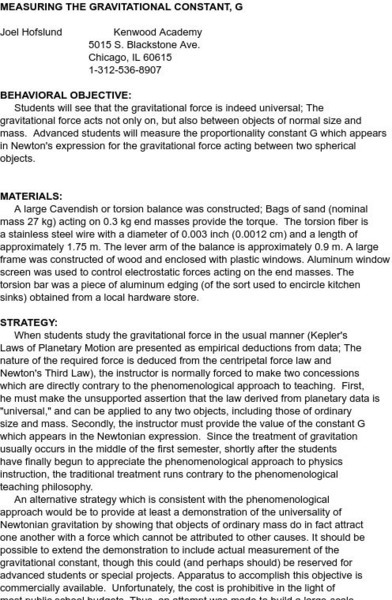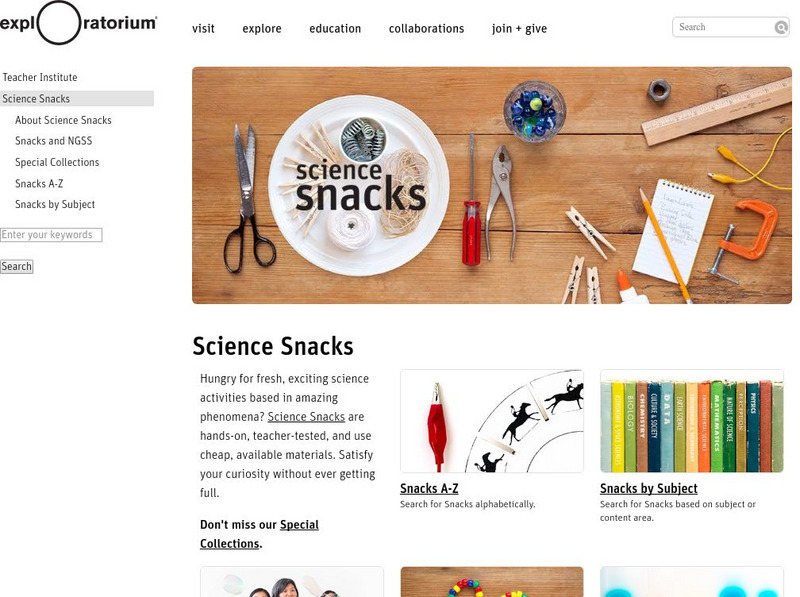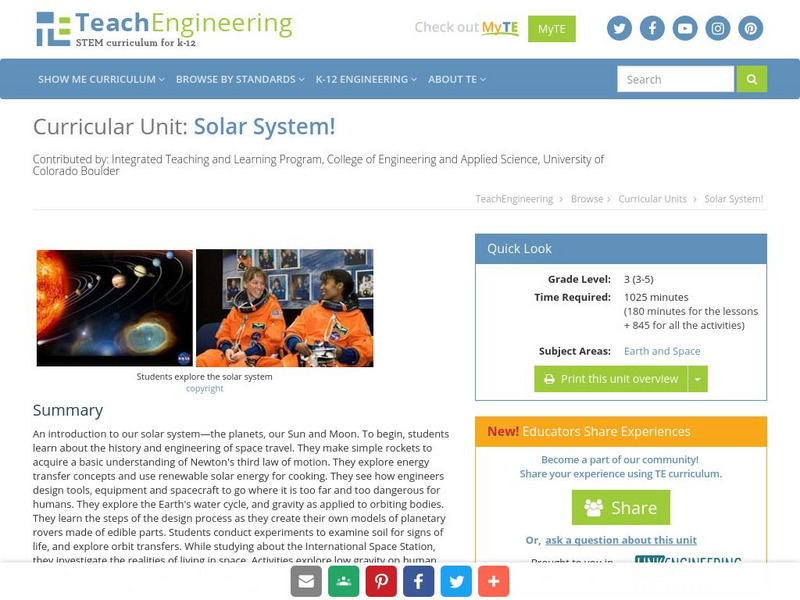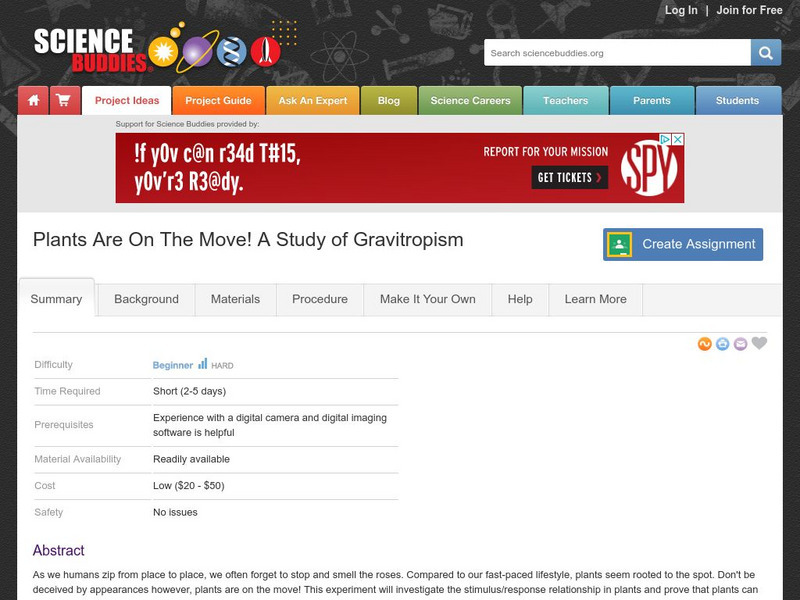Bill Nye
Bill Nye: Penny Droplets
This tutorial by Bill Nye introduces the concept of a cohesive force through an experiment involving a penny and droplets of soapy water.
PBS
Pbs Learning Media: Newton's Third Law: Action Reaction
An early astronaut's experiences teach students that Newton's third law of motion-for every action, there is an equal and opposite reaction-applies both on Earth and in outer space.
Science Fun for Everyone
Science Fun: Egg Drop
Learn about inertia with this egg drop science experiment. Try not to crack too many eggs!
Science and Mathematics Initiative for Learning Enhancement (SMILE)
Smile: Measuring the Gravitational Constant, G
A demonstration/lab idea for determining the numerical value of the universal gravitation constant using a torsion balance.
Science Education Resource Center at Carleton College
Serc: Using Egg Drop Activity to Promote Critical Thinking and Analysis Skills
In this multi-instructional activity hands-on inquiry activity, students will develop their critical thinking skills by designing and constructing an apparatus that will permit an egg to survive a nine foot fall. Given limited materials,...
Exploratorium
Exploratorium: Science Snacks: Falling Rhythm
An engineering design process project for students to create a regular rhythm of beats by spacing weights along a string and then dropping the string.
Exploratorium
Exploratorium: Snacks
Exploratorium's snacks aren't edible, but they are good! Use your science skills to discover gravity, learn about biology, do fun experiments.
Concord Consortium
The Concord Consortium: Molecular Workbench: Rolling Down an Inclined Plane
Experiment with gravity as a variable to observe the effects of gravity on an object rolling down an inclined surface.
Bill Nye
Bill Nye: Penny Droplets
Try this at-home science experiment to learn about the forces of gravity, cohesion, and adhesion.
Bill Nye
Bill Nye: Orbiting Marbles
Try this at-home science experiment to learn how Earth's gravity pulls an object so that it's constantly changing direction.
Treehut
Suzy's World: Black Holes
Use this site to find out what is a black hole in space and try an experiment.
Bill Nye
Bill Nye: Twistin' Tornado
Try this at-home science experiment to learn how to make a tornado in a bottle.
Bill Nye
Bill Nye: Weightless Clothespin
Try this at-home science experiment to learn that that astronauts fly around in space because they are weightless.
Curated OER
Science Kids: Science Images: Eye Tracking Device
An astronaut experiments in gravity free space with an eye tracking device. The complicated equipment rests on the astronauts head as he floats around the shuttle.
Curated OER
Science Kids: Science Images: Research in Space
This photo shows an astronaut researching in the zero gravity environment of space.
Physics Classroom
The Physics Classroom: Cavendish and the Value of G
A short description of how Cavendish measured the value of G - the universal gravitation constant and supported Newton's theory. Illustrated.
TeachEngineering
Teach Engineering: Solar System!
An introduction to our solar system: the planets, our Sun and our Moon. Students begin by learning the history and engineering of space travel. They make simple rockets to acquire a basic understanding Newton's third law of motion. They...
Science Buddies
Science Buddies: Plants Are on the Move! A Study of Gravitropism
As we humans zip from place to place, we often forget to stop and smell the roses. Compared to our fast-paced lifestyle, plants seem rooted to the spot. Don't be deceived by appearances however, plants are on the move. This experiment...
TeachEngineering
Teach Engineering: The Big Mo
Momentum is not only a physical principle; it is a psychological phenomenon. Students learn how the "Big Mo" of the bandwagon effect contributes to the development of fads and manias, and how modern technology and mass media accelerate...
TeachEngineering
Teach Engineering: Couch Potato or Inertia Victim?
Students design a simple behavioral survey, and learn basic protocol for primary research, survey design and report writing. Note: The literacy activities for the Mechanics unit are based on physical themes that have broad application to...
TeachEngineering
Teach Engineering: It Takes Two to Tangle
Students explore the theme of conflict in literature. They learn the difference between internal and external conflict and various types of conflicts, including self against self, self against other, and self against nature or machine....
TeachEngineering
Teach Engineering: Team Up!
Students explore the physical and psychological effect of stress and tension on human beings. They develop their observing, thinking, writing and teamwork skills by working on a group art project and reporting about it. They learn about...
TeachEngineering
Teach Engineering: Stress, Inc.
Students explore the physical and psychological effect of stress and tension on human beings. Concepts of stress and stress management are introduced. Students discover how perception serves to fuel a huge industry dedicated to...
TeachEngineering
Teach Engineering: Sliding Textbooks
In this culminating activity of the unit which highlights how forces play a role in engineering design and material choices, students explore and apply their knowledge of forces, friction, acceleration, and gravity in a two-part experiment.













